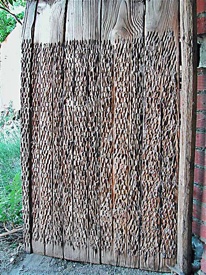Is it possible to trace an intellectual connection from Roman horti to the medieval and renaissance physic garden to colonial botanic gardens such as Kew to the modern genebank? Possibly. If so, news of an archaeological discovery not far from where I’m sitting will be of importance to all who take an interest in agricultural biodiversity.
Archaeology of food
Speaking of conferences, there’s another one that’s worth keeping an eye on, which I learned about via Eurekalert. It’s called Food and Drink in Archaeology 2007 and will feature a keynote address by Professor Martin Jones of the Department of Archaeology, University of Cambridge entitled “Feast: Why Humans Share Food.”
Why is this relevant to us here at the Agricultural Biodiversity Weblog? Well…
Whilst the importance of nutrition for survival has long been recognised, recent studies have increasingly stressed the cultural significance of the production, distribution and consumption of foodstuffs through out all archaeological periods. An understanding of diet in past societies is therefore crucial to an understanding of daily life, and the relationships between different classes and societies throughout the world.
Potato foundation story
You may remember a post a few weeks back on the origins of potato late blight. Now comes news of a DNA study which looked at the origin of the European potato itself.
The spud was introduced into Europe via the Canary Islands in the mid-16th century. The authors of the study compared landraces currently grown in the Canaries, which are thought to be the descendents of those early introductions, with material from Chile and the Andes. There has long been controversy about whether European varieties trace their origins to one or the other of these places.
It turns out the answer is probably both: there were
“multiple early introductions of both Andean and Chilean germplasm to the Canary Islands and to Europe,” said Dr. David Spooner, co-author of the Crop Science study.
Traditional farming in Spain … and elsewhere
 National Geographic has a fine feature called Photo of the Day. Today’s shows a Spanish farmer with a wooden, sled-like contraption with sharp rocks embedded in the bottom. It’s a threshing board, used at harvest time to cut up straw, separate cereal grains from chaff and break open chickpea pods. Now, unfortunately I can’t just take the NatGeo photo and put it up here for you to see, you’ll just have to go to their site, but I did look around for an illustration that was in the public domain, and I found it at Answers.com, in a fascinating article on the history of these tools. The NatGeo photo is worth seeing, though. While surfing, I also ended up at the Food Museum Online, which I’d never come across before. It’s not the prettiest looking site, but it has some great content, including illustrations of traditional farming practices and tools. There’s also a blog, with a feed.
National Geographic has a fine feature called Photo of the Day. Today’s shows a Spanish farmer with a wooden, sled-like contraption with sharp rocks embedded in the bottom. It’s a threshing board, used at harvest time to cut up straw, separate cereal grains from chaff and break open chickpea pods. Now, unfortunately I can’t just take the NatGeo photo and put it up here for you to see, you’ll just have to go to their site, but I did look around for an illustration that was in the public domain, and I found it at Answers.com, in a fascinating article on the history of these tools. The NatGeo photo is worth seeing, though. While surfing, I also ended up at the Food Museum Online, which I’d never come across before. It’s not the prettiest looking site, but it has some great content, including illustrations of traditional farming practices and tools. There’s also a blog, with a feed.
Photo of a Spanish “trillo” by José-Manuel Benito
Domestication
Michael’s post on water buffalo genetic diversity and domestication reminded me that I was intending to point you all in the direction of Dienekes’ Anthropology Blog. Although Dienekes mainly blogs about the genetic diversity and evolution of humans, he does occasionally link to papers on animal domestication and related issues. He has an RSS feed, which makes it easy to monitor his blog. In the past couple of years he has pointed to interesting papers on:
Incidentally, a great paper reviewing the use of genetics and archaeology to document domestication came out last year and you can see the abstract here. Now, what’s really needed is for someone to bring together the human, livestock and crop genetic data.